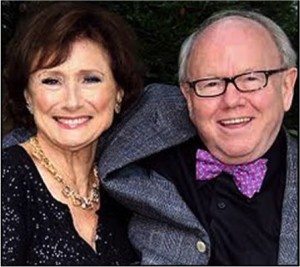
I n their current show at the Metropolitan Room, Delphi Harrington and Woody Regan, two pleasantly seasoned performers of a certain age, with help from director Ann McCormack, have managed to create the feel of performing ad hoc at a party in someone's living room. This is mostly a good thing, as "Cowardly Swann," their awkwardly titled pairing of the songs of Flanders and Swann with those of Noël Coward, does not provide a natural symbiosis among the songwriters. True, they were showbiz contemporaries in the late 1950s and through the 1960s. All three men were Brits and wits and owe a lot to Gilbert and Sullivan before them. But Coward and Flanders & Swann wrote and presented themselves in very different styles from each other.
n their current show at the Metropolitan Room, Delphi Harrington and Woody Regan, two pleasantly seasoned performers of a certain age, with help from director Ann McCormack, have managed to create the feel of performing ad hoc at a party in someone's living room. This is mostly a good thing, as "Cowardly Swann," their awkwardly titled pairing of the songs of Flanders and Swann with those of Noël Coward, does not provide a natural symbiosis among the songwriters. True, they were showbiz contemporaries in the late 1950s and through the 1960s. All three men were Brits and wits and owe a lot to Gilbert and Sullivan before them. But Coward and Flanders & Swann wrote and presented themselves in very different styles from each other.
Michael Flanders, who wrote the words to their songs, and Donald Swann, who composed most of their music, were benign satirists who took the stage mostly in business suits and stayed seated throughout their sets. (Swann held fast to his piano bench, and Flanders sat in a wheelchair owing to his suffering from polio.) Their heyday, both in their home country and here on Broadway, centered on their long-running hit show, At the Drop of a Hat, and its sequel, At the Drop of Another Hat. But the number of people who saw either of those shows is rapidly dwindling—although YouTube does provide abundant clips to a relatively small secondary market. (Regan and Harrington themselves both saw At the Drop of a Hat in 1959, albeit separately.)
Coward, on the other hand, had a widely successful career and recognizable persona for five decades, from the 1920s into the early 1970s, as a playwright, actor, and director, as well as the composer and lyricist of some 300 songs. He embodied the essence of high-toned sophistication of the smoking-jacket, cigarette-holder variety. (He even played Las Vegas successfully in a mid-20th century comeback.) Coward's catalog is well-known and loved, and often performed to this day. Flanders and Swann, by contrast, wrote fewer than 100 songs; the best-known of them—with one exception—come from a series of children's songs about animals. As befits this imbalance in tone and output, Harrington and Regan perform ten songs by Coward and only five from Flanders and Swann. Disparity be damned, they soldier on.
Or rather they "Sail Away," in the words of Coward's oft-performed 1950 song, as nicely sung by Harrington here. Alternately standing or sitting on a stool, she evinces an immediate, natural affinity for Coward's oeuvre. She is elegantly dressed in a black-sequined top and pink-sequined Capri pants, the combination perhaps a subtle homage to the 1950s, the decade in which she got her start in a Julius Monk Plaza Nine revue. Harrington also scores with her renditions of Coward's "A Bar on the Piccola Marina" and "Twentieth Century Blues." Together, Regan and Harrington give us nifty duets on the haunting "If Love Were All" and the all-out comic (Don't Put Your Daughter on the Stage) "Mrs. Worthington."
Starting at the top with the Flanders and Swann catalog, a smiling Regan, looking a lot like Mr. Pickwick as embodied by Harry Secombe, plays and sings (Have Some) "Madeira, M'dear," the saucy older-man, younger-woman seduction song popularized by Glenn Yarbrough and the Limeliters. Regan also gives us the F&S animal song "The Gnu," with the lyric "the gnicest work of gnature in the zoo," and the pair's silly and soapy "In the Bath." Harrington's homage to Swann is the Oxford-educated Grecophile composer's "Kokoraki," which she sings entirely in Greek (as Swann wrote it), but which also talks of animals, such as chickens, lambs, donkeys, dogs, cats and pigs. Yet another Flanders & Swann animal number "The Hippopotamus" provides a show-ending audience sing-along, with its unforgettable lyric "Mud, mud, glorious mud/ Nothing quite like it for cooling the blood." ("The Hippopotamus" had an afterlife as a children's book, so it remains familiar to a somewhat wider audience.) But the really final word comes from the master, Coward's "I'll See You Again," in the form of an even more robust sing-along.